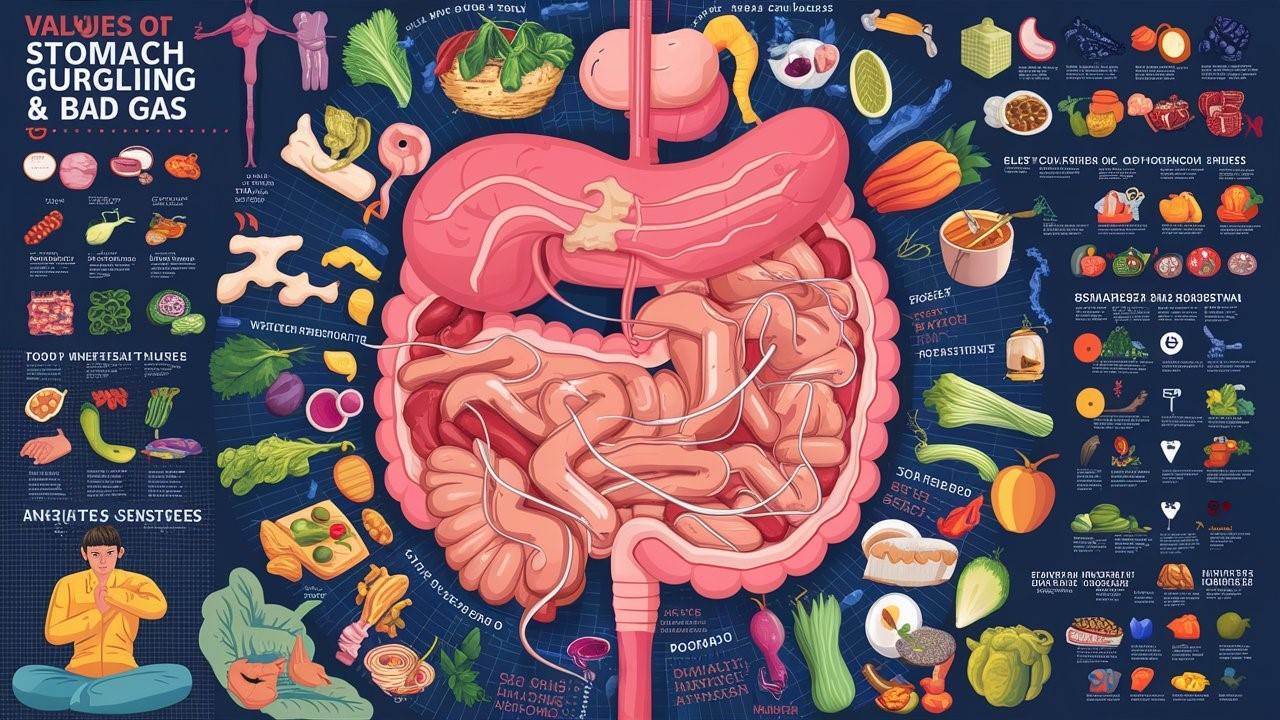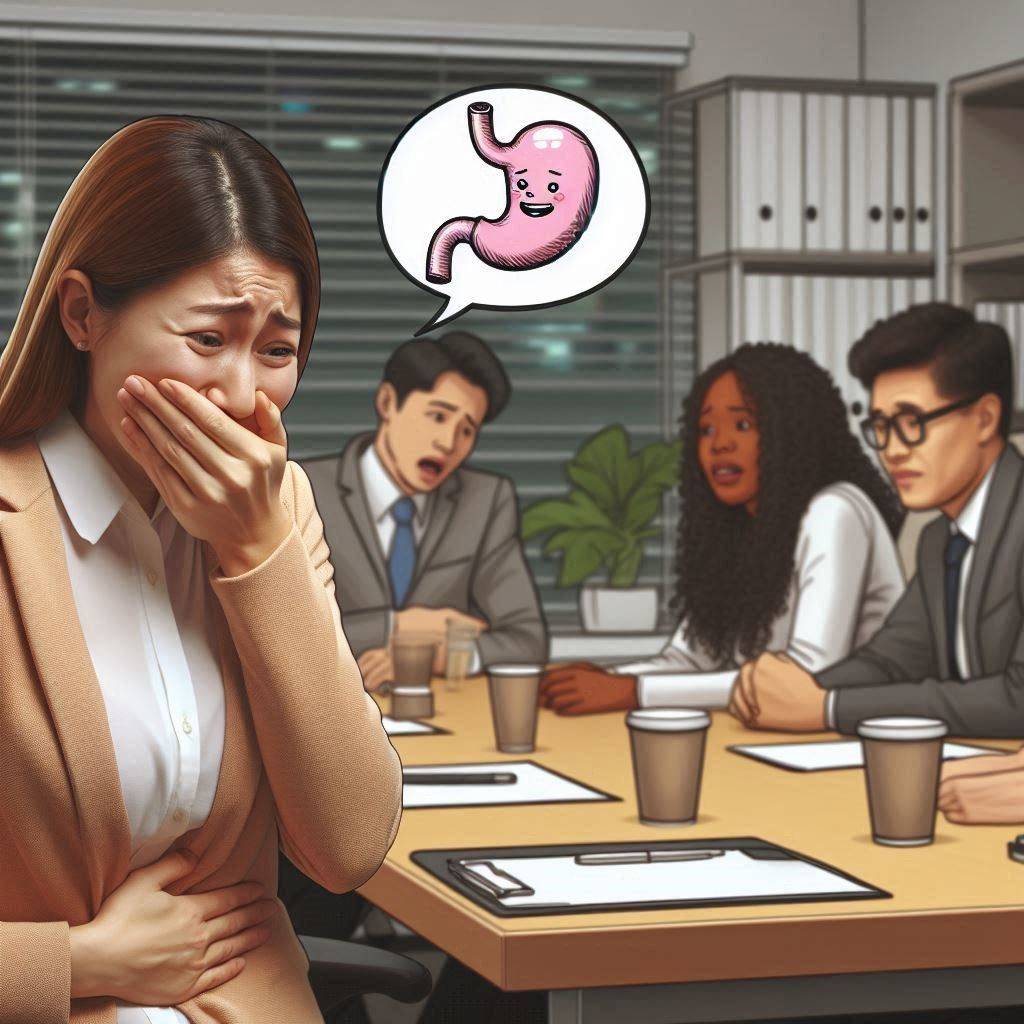Uncover the root causes of stomach gurgling bad gas and learn effective remedies. Discover when to seek medical help and how to prevent future discomfort.
Quick Guide: Stomach gurgling bad gas
- Common causes: Digestive issues, food intolerances, anxiety, bacterial imbalance
- Quick fixes: Peppermint tea, gentle abdominal massage, probiotics, heat therapy
- When to worry: Persistent symptoms, severe pain, unexplained weight loss, blood in stool
- Prevention: Balanced diet, stress management, regular exercise, mindful eating
Introduction
We’ve all been there – sitting in a muted room when suddenly your stomach decides to put on an impromptu sound performance. Stomach gurgling bad gas is not just embarrassing; it can be uncomfortable and sometimes even painful. In this comprehensive guide, we’ll dive deep into the causes of these digestive disturbances, explore effective solutions, and help you understand when it’s time to seek professional medical advice.
What Causes Stomach Gurgling Bad Gas?

To effectively address stomach gurgling bad gas, it’s crucial to understand its root causes. Let’s explore each factor:
1. Normal Digestive Processes
Believe it or not, some level of gurgling is a sign that your digestive system is working properly. The medical term for these sounds is “borborygmi”.
What’s happening: As food, liquids, and gas move through your stomach and intestines, they cause vibrations. These vibrations create the gurgling sounds you hear.
When it becomes a problem: If the gurgling is excessively loud, frequent, or accompanied by discomfort, it may indicate an underlying issue.
2. Food Intolerances and Sensitivities
Your body may react negatively to certain foods, leading to increased gas production and gurgling.
Common culprits:
- Lactose (found in dairy products)
- Gluten (found in wheat, barley, and rye)
- FODMAPs (fermentable oligosaccharides, disaccharides, monosaccharides, and polyols)
- Artificial sweeteners
- Spicy or fatty foods
How it causes gurgling: These foods can be difficult for some people to digest, leading to excess gas production and increased intestinal movement.
3. Bacterial Imbalance in the Gut
Your gut is home to trillions of bacteria, collectively known as the gut microbiome. An imbalance in this ecosystem can lead to digestive issues.
Causes of imbalance:
- Antibiotic use
- Poor diet
- Chronic stress
- Lack of sleep
- Certain medical conditions
How it leads to gurgling: An unhealthy gut microbiome can lead to increased gas production and altered gut motility, resulting in more noticeable gurgling sounds.
4. Anxiety and Stress
The connection between your gut and brain, known as the gut-brain axis, means that your emotional state can directly affect your digestive system.
How stress affects digestion:
- Increases gut sensitivity
- Alters gut motility
- Affects the balance of gut bacteria
- This can lead to inflammation in the digestive tract
Result: These stress-induced changes can manifest as increased gurgling, gas, and general digestive discomfort.
5. Medical Conditions
Sometimes, persistent stomach gurgling bad gas can be a symptom of an underlying medical condition.
Potential conditions include:
- Irritable Bowel Syndrome (IBS)
- Inflammatory Bowel Disease (IBD), such as Crohn’s disease or ulcerative colitis
- Celiac disease
- Small Intestinal Bacterial Overgrowth (SIBO)
- Gastroparesis (delayed stomach emptying)
How these conditions cause gurgling: Each of these conditions can alter gut function, leading to increased gas production, changes in gut motility, or both.
Quick Fixes for Stomach gurgling bad gas

When stomach gurgling bad gas strikes, try these remedies for quick relief:
1. Peppermint Tea
Peppermint has been used for centuries to soothe digestive discomfort.
How it works: Peppermint contains menthol, which has an antispasmodic effect on the smooth muscle of the digestive tract. This can help reduce bloating and gas.
How to use: Steep a peppermint tea bag or fresh peppermint leaves in hot water for 5-10 minutes. Sip and mindfully.
2. Gentle Abdominal Massage
A simple massage can help move gas through your intestines and relieve discomfort.
How to do it:
- Lie on your back in a comfortable position.
- Place your hands just above your right hip bone.
- Rub in a circular motion with light pressure up toward the right side of your ribcage.
- Move straight across to the left side of your body.
- Move down to the left hip bone.
- Repeat for 2-3 minutes.
3. Probiotics
Probiotics are beneficial bacteria that can help restore balance to your gut microbiome.
Types of probiotics:
- Lactobacillus species
- Bifidobacterium species
- Saccharomyces boulardii (a beneficial yeast)
How to use: You can take probiotic supplements or consume probiotic-rich foods like yogurt, kefir, sauerkraut, or kombucha.
4. Heat Therapy
Applying heat to your abdomen can help relax the muscles of your gut and relieve discomfort.
How it works: Heat increases blood flow to the area and can help reduce muscle spasms.
How to use: Apply a heating pad or hot water bottle to your abdomen for 15-20 minutes at a time.
5. Mindful Eating
How you eat can be just as important as what you eat for managing stomach gurgling bad gas.
Tips for mindful eating:
- Chew your food thoroughly (aim for 20-30 chews per bite)
- Eat slowly and without distractions
- Avoid talking while eating
- Don’t drink large amounts of liquid with meals
Why it helps: Mindful eating can reduce the amount of air you swallow while eating and improve overall digestion.
When Should You Be Worried About Stomach gurgling bad gas?
While occasional stomach gurgling bad gas is normal, certain symptoms warrant medical attention:
- Persistent symptoms lasting more than a week
- Severe abdominal pain
- Unexplained weight loss
- Blood in stool
- Fever accompanying digestive issues
- Changes in bowel habits (constipation or diarrhea)
- Nausea or vomiting
- Loss of appetite
Preventing Stomach gurgling bad gas
Prevention is key to managing stomach gurgling bad gas. Here are some strategies to keep digestive discomfort at bay:
1. Balanced Diet
A well-balanced diet can significantly reduce the occurrence of stomach gurgling bad gas.
Key components:
- Fiber-rich foods (fruits, vegetables, whole grains)
- Lean proteins
- Healthy fats (avocados, nuts, olive oil)
- Adequate hydration (aim for 8 glasses of water per day)
Why it works: A balanced diet supports overall gut health and can help prevent issues that lead to excess gas and gurgling.
2. Identify Trigger Foods
Keeping a food diary can help you identify foods that may be causing your digestive discomfort.
How to do it:
- Record everything you eat and drink for at least two weeks.
- Note any symptoms you experience and when they occur.
- Look for patterns between certain foods and your symptoms.
- Try eliminating suspected trigger foods for a few weeks and see if symptoms improve.
3. Stress Management
Given the strong connection between stress and digestive health, managing stress is crucial for preventing stomach gurgling bad gas.
Effective stress management techniques
- Meditation
- Deep breathing exercises
- Yoga
- Regular exercise
- Adequate sleep (7-9 hours per night)
- Journaling
- Talking to a therapist or counsellor
4. Regular Exercise
Physical activity can help promote healthy digestion and reduce stress.
Benefits of exercise for digestion:
- Stimulates intestinal contractions
- Reduces transit time of food through the digestive system
- Helps maintain a healthy weight
- Reduces stress and anxiety
Recommended amount: Aim for at least 150 minutes of moderate-intensity exercise per week.
5. Avoid Carbonated Drinks and Chewing Gum
Both carbonated beverages and chewing gum can introduce excess air into your digestive system, leading to increased gas and gurgling.
Alternatives to try:
- Flavored still water
- Herbal teas
- Fresh fruit for a sweet treat instead of gum
FAQs About Stomach Gurgling Bad Gas
Why is my stomach constantly gurgling and gassy?
Constant stomach gurgling bad gas can be caused by various factors, including:
- Overactive digestive system: Your digestive system might be working overtime to process food, leading to increased movement and gas production.
- Food intolerances or sensitivities: You may be consuming foods that your body has difficulty digesting, such as lactose or gluten.
- Imbalanced gut bacteria: An unhealthy gut microbiome can lead to excess gas production and altered gut motility.
- Chronic stress or anxiety: The gut-brain connection means that psychological stress can manifest as physical symptoms in your digestive system.
- Certain medical conditions: Conditions like IBS, IBD, or celiac disease can cause chronic digestive issues.
- Medications: Some medications, particularly antibiotics, can disrupt your gut bacteria and lead to digestive symptoms.
- Eating habits: Eating too quickly, not chewing thoroughly, or consuming a lot of gas-producing foods can contribute to gurgling and gas.
If you’re experiencing persistent symptoms, it’s best to consult with a healthcare professional for a proper diagnosis and personalized treatment plan.
When should I be worried about stomach noises?
While occasional gurgling is normal, be concerned if you experience:
- Loud, persistent noises accompanied by pain: This could indicate an obstruction or inflammation in your digestive tract.
- Gurgling along with other symptoms: Watch out for additional symptoms like fever, unexplained weight loss, or blood in stool, which could indicate a more serious condition.
- Noises that interfere with daily life or sleep: If the gurgling is so loud or frequent that it’s disrupting your daily activities or sleep, it’s worth getting checked out.
- Changes in bowel habits: If the gurgling is accompanied by persistent diarrhea, constipation, or alternating between the two, consult a doctor.
- Gurgling with nausea or vomiting: This combination of symptoms could indicate a more serious digestive issue.
- Stomach noises with unexplained fatigue: Persistent fatigue, along with digestive symptoms, could be a sign of nutrient malabsorption or other health issues.
These could indicate underlying health issues that require medical attention. Always trust your instincts – if you’re concerned about your symptoms, it’s better to get checked by a healthcare professional.
What to take when your stomach is gurgling?
For relief from stomach gurgling bad gas, consider:
- Over-the-counter gas relievers: Simethicone-based products can help break up gas bubbles in your digestive tract.
- Peppermint or ginger tea: These natural remedies can help soothe the digestive system and reduce gas.
- Probiotics: These beneficial bacteria can help restore balance to your gut microbiome. Look for a high-quality supplement or consume probiotic-rich foods.
- Digestive enzymes: Taking these before meals can help your body break down food more efficiently, reducing gas production.
- Activated charcoal: This can help absorb excess gas in the digestive tract. However, consult your doctor before using it, as it can interfere with medication absorption.
- Herbal supplements: Caraway, fennel, and anise have traditionally been used to aid digestion and reduce gas.
- Apple cider vinegar: A tablespoon in water before meals may help stimulate digestive juices and reduce gas production.
Remember, these are temporary solutions. If symptoms persist, seek medical advice to address the underlying cause of your digestive issues.
Why does my stomach gurgle and I have gas when I lay down?
Stomach gurgling bad gas when lying down can occur because of several factors:
- Gravity’s effect on digestion: When you’re upright, gravity helps move food and gas through your digestive system. Lying down removes this assistance, leading to trapped gas and increased gurgling.
- Trapped gas moving through the intestines: As you lie still, gas that has built up during the day may start moving through your intestines, causing noticeable sounds and sensations.
- Slower digestion at night: Your digestive system naturally slows down at night, which can lead to increased fermentation of undigested food, producing more gas.
- Eating too close to bedtime: If you eat an enormous meal shortly before lying down, your body is still actively digesting, which can cause increased gurgling and gas.
- Specific sleeping positions: Certain sleeping positions may put pressure on your stomach or intestines, leading to increased noise and discomfort.
- Underlying digestive issues: Conditions like GERD (gastroesophageal reflux disease) can worsen when lying down, leading to increased gurgling and discomfort.
To minimize nighttime gurgling and gas:
- Try elevating your head slightly while sleeping
- Avoid large meals 2-3 hours before bedtime
- Experiment with different sleeping positions
- Consider using extra pillows for support
- Practice relaxation techniques before bed to reduce any anxiety that might be contributing to your symptoms
Conclusion
Understanding and managing stomach gurgling bad gas can significantly improve your quality of life. By identifying triggers, implementing preventive measures, and knowing when to seek help, you can take control of your digestive health. Remember, everyone’s body is different, so what works for one person may not work for another. Be patient and listen to your body as you find the best solutions for you.
Thank you for reading this comprehensive guide on stomach gurgling bad gas. We hope you found it helpful and informative!
Recommended Reading
- How to Heal Your Gut: Enhancing Your Digestive Health
- Can Anxiety Cause Nausea? 5 Surprising Ways It Affects Your Gut
- High-Fiber Foods Chart for Constipation: Your Path to a Healthier Gut



